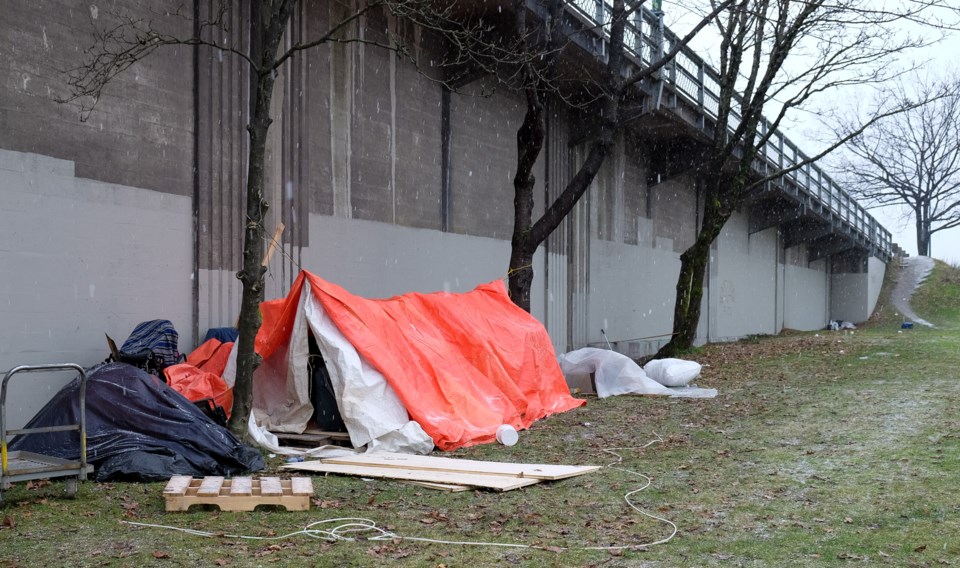Homeless count results are never good news in Vancouver.
Results released this month from the region-wide count in March show the number of people without a home in the city increased from 1,600 in 2013 to 2,420 this year.
But another statistic that seldom gets highlighted is the number of homeless people who got housing and other residents who avoided eviction.
The statistic was shared Tuesday at city hall by members of the city’s homelessness services division, who told council that its team “secured” housing for 632 people in 2022.
Secured, in this case, means either finding housing for someone living on the street, or helping a person facing eviction maintain their accommodation.
Bruk Melles, the city’s director of homelessness services, said a team comprised of staff working out of an office on Powell Street and others doing outreach work have been responsible for keeping people from falling into homelessness.
“It’s been fairly consistent,” said Melles of the hundreds of people each year assisted by the team.
The 632 excludes the unknown number of homeless people and residents in precarious housing situations assisted by other agencies and services. The 632 alone, however, gives an indication of how many people in the city are vulnerable to homelessness.
'As long as it takes'
The team’s work also involves connecting people with health care, social assistance, replacing lost identification and doing taxes, with an employee assisting last year with an estimated 3,000 tax forms.
“It's almost like we’re a victim of our own success, in a way,” said Melles, noting the team sees an average of 120 people per day. “Our team members will work with clients as long as it takes. Often, you'll see someone there for two hours working with somebody, understanding what their core issues are that they need support with.”
Issues identified by respondents to a survey conducted during the homeless count in March were consistent with previous findings — that drivers of homelessness are poverty, addiction, mental illness, poor health and trauma.
More than 60 per cent of respondents identified two or more health concerns and 32 per cent reported having an acquired brain injury. More than 50 per cent visited an emergency room in the last year and 42 per cent required an ambulance.
Other findings:
• Of the 2,420 people identified as homeless, 1,815 were staying in some form of shelter and 605 were unsheltered.
• 78 per cent of people who agreed to be surveyed were living in Â鶹´«Ã½Ó³»when they became homeless.
• 62 per cent of people had lived in Â鶹´«Ã½Ó³»for five years before becoming homeless.
• 66 per cent of unsheltered respondents reported accessing an emergency shelter in the last year.
• 54 per cent had stayed at someone else’s place in the last year.
• Only 17 per cent of shelter beds in Â鶹´«Ã½Ó³»are specific to women compared to 44 per cent for men.
• Indigenous peoples are 18 times more likely to be homeless than non-Indigenous people.
• Â鶹´«Ã½Ó³»has 36.4 homeless people for every 10,000 people; New Westminster has 27.1, Surrey 19.5, Delta 4.13.
'Very little uptake'
Council’s ongoing concern that Â鶹´«Ã½Ó³»is providing more services and housing for people in need than other cities in the region was raised again, with city manager Paul Mochrie saying the city was getting “very little uptake” from staff at the Metro level to coordinate a regional response to homelessness.
The number of people in Metro Â鶹´«Ã½Ó³»identified as homeless during the count in March totalled 4,821 — a 32 per cent increase over the last regional count in March 2020 when 3,634 were recorded without a home.
While Â鶹´«Ã½Ó³»(2,420) and Surrey (1,060) had the most homeless, the nine other cities in the region all saw increases in homelessness, including the Tri-Cities, where numbers almost doubled from 86 in 2020 to 160 in 2023.




